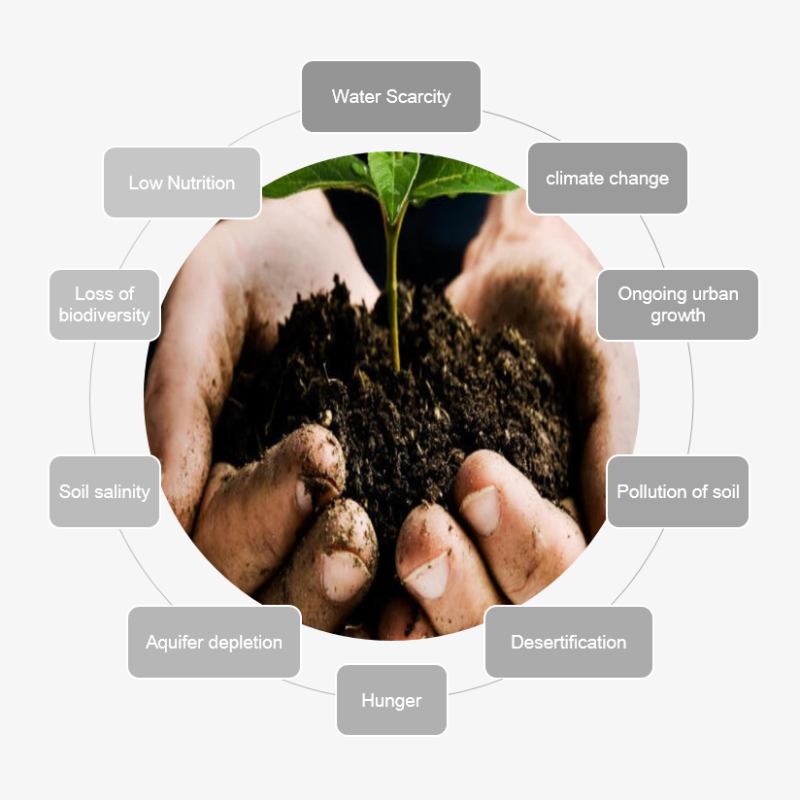facing world challenges
Sustainable agriculture plays a crucial role in addressing the world’s pressing challenges, including food security, climate change, and biodiversity loss. AMAN sustainable agricultural units improves resilience to climate impacts, ensuring that farming communities can adapt to changing conditions and fosters local economies and empowers smallholder farmers, contributing to social equity and reducing poverty. As such, it presents a holistic solution that can help nourish a growing global population while safeguarding the planet for future generations.

PEOPLE FACED HUNGER IN 2022.ALMOST 600 MILLION PEOPLE ARE PROJECTED TO BE CHRONICALLY UNDERNOURISHED IN 2030.
FOA
PEOPLE WHO ARE EITHER MODERATELY OR SEVERELY FOOD INSECURE IN THE WORLD, ASSESSED USING THEFOOD INSECURITY EXPERIENCE SCALE (FIES).SOFI REPORT/SDG INDICATOR 2.1.2
FOA
IN HOTSPOTS IN 58 FOOD CRISIS COUNTRIES AND TERRITORIES ARE FACING CRISIS LEVEL OF FOOD INSECURITY IN THE SHORT-TERM WHICH IS SO SEVERE THAT IT THREATENS LIVES OR LIVELIHOODS (ACUTE FOOD INSECURITY)
Global Food Crisis Report
- The current patterns of agricultural intensification are not proving sustainable. High levels of land and water use are stretching the productive capacity of land and water systems to the limit, and severely degrading land and environmental services in the process. Climate change is expected to increase evapotranspiration and alter the quantity and distribution of rainfall, leading to changes in land/crop suitability and greater variations in river run-off and groundwater recharge. Download Synthesis report 2021 PDF
- 72% of all freshwater withdrawals are used by agriculture, 16% by industries, and 12% by municipalities. UN-Water
- Agriculture is the largest consumer of the world’s freshwater resources, and more than one-quarter of the energy used globally is expended on food production and supply. UN-Water
- Demand for water, food and energy is increasing. Pressure on the nexus is being driven by a rising global population, rapid urbanization, changing diets and economic growth. UN-Water
- Global water demand is projected to increase by 20 to 30% by 2050. UN-Water

Aman system Advantages

Less Water

Reduce energy

Less Waste

One Input
It will grow much more food – for far less water & energy of a similar size garden.
It’s more sustainable – no waste stream. Everything can be 100% recyclable.
It provides for precise watering and feeding…in a timely manner.
- It can be done anywhere including indoors and deserts
It’s easier to learn and operate.
If stopped for any reason it can be stored and get bio-activated quickly.
It’s more productive…it will grow more food for fewer inputs in a given footprint
It’s organic by design an Eco system that recreates the rhizosphere .
It requires far less labor input…no digging, weeding or hand watering.
It’s more resilient…it will recover faster from setbacks.
Our Growing Media is a permanent asset that does not require replacement.
Diverse , Can grow root crops, melons and vine crops, fruit trees, ornamentals, grapes ,leafy greens and flowers…and even potatoes it is also used to propagate plant and seedlings.
It’s less likely (depending on its source) to harbor soil-borne diseases…and if it does contract a soil disease, it can be more readily disinfected.
our system is aligned with United Nation SDG
AMAN Grow’s innovative Modular Food Production System (AMAN MPFS) aligns seamlessly with the United Nations Sustainable Development Goals (SDGs). Our closed-loop technology delivers fresh, organic vegetables and high-quality fish protein with over 90% water savings and no environmental impact. By enhancing local food security, reducing carbon emissions, and promoting education, gender equality, and sustainability, AMAN Grow supports resilient, eco-friendly communities while safeguarding natural resources for future generations.

ZERO HUNGER

Good health ans well-being

QUALITY EDUCATION

GENDER EQUALITY

CLEAN WATER AND SANITATION

DECENT WORK AND ECONOMIC GROWTH

INDUSTRY, INNOVATION AND INFRASTRUCTURE

SUSTAINABLE CITIES AND COMMUNITIES

RESPONSIBLE CONSUMPTION & PRODUCTION

CLIMATE ACTION

LIFE BELOW WATER
comparing aman's iAVS system
| AMAN System ”iAVS” | Aquaponics | Hydroponics | Conventional Farming / Soil | |
|---|---|---|---|---|
| Water Replacement / Consumption | Never / evaporation top up | Never / evaporation top up | Need to replace water regularly | High |
| Protein Produce / Fish & Crops | Yes | Yes | No | No |
| Filtration | Does not require any filters | Mechanical and biological filters Needed | RO | Drum Filters |
| Fertilization technique | Eco System / using fish | Eco System/using fish | Chemical Fertilizer | Chemicals |
| Complexity | Easy to build | Complex | Complex | Easy but needs Expertise |
| Circulating pump / energy | 2 hours a day | Continuous Running | Continuous Running | Upon irrigation |
| Fertilization | Only Fish Feed | Only Fish Feed | Multiple Chemical Fertilizers | Multiple Chemical Fertilizers |
| Diversity Using Same Water | Yes | Yes | No | No |
| Root Crops | Yes | No | Yes | Yes |
| Ease of Operation | Simple to use | Need Expertise | Need Expertise | Need Expertise |
| Startup Cost | Moderate | High | High | Low |
| Organic Produce | Yes | Yes | No | Can Be |
| Reusable Media | Yes | Yes | No | N/A |
| Disease Recovery | Fast | No | No | No |
| Crop Orientation Preparation | Direct / No Efforts needed | Direct but Need rewash | Need sterilization | Need sterilization |

